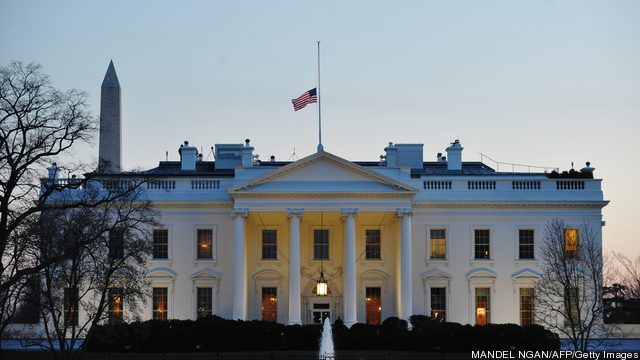The deputy crown prince’s first solo trip to Washington confirms his preeminence in the Saudi hierarchy but could spur pushback from royal rivals.
On June 13, Prince Muhammad bin Salman, known as MbS, arrived in the United States for a visit that will likely include New York and the west coast as well as Washington. The conversations he is expected to have with the Obama administration and Congress will be crucial to the bilateral relationship. Although the thirty-year-old deputy crown prince holds various official positions (second deputy prime minister, defense minister, and president of the Council of Economic and Development Affairs), his most important qualification is that he is the favorite son of the ailing eighty-year-old monarch, King Salman. As such, he represents the future of Saudi Arabia — all the more so because he recently launched a “National Transformation Program 2020” as part of his “Vision 2030,” with the aim of steering the kingdom’s economy away from overreliance on oil reserves.
This is his third trip to Washington in just over a year. In May 2015, he accompanied his older cousin, Crown Prince Muhammad bin Nayef (MbN), to a summit of Gulf leaders at Camp David, where President Obama attempted to placate concerns about the nuclear deal with Iran. Then, in September, he returned to Washington with his father, who allowed him to do much of the talking in an Oval Office meeting with the president.
Yet this week’s solo trip will effectively anoint MbS as the main point of contact between Riyadh and Washington, sidelining the formal heir apparent MbN, whom U.S. officials had previously regarded as the “prince of counterterrorism” and “Washington’s favorite Saudi.” During MbN’s December 2014 and May 2015 White House visits, he was feted by the president and top security officials. Now that honor belongs to MbS, who has meetings scheduled in the White House and in Congress — including with officials and committees overseeing homeland security and intelligence issues, which would normally be considered part of MbN’s bailiwick.
Despite initial reports depicting the younger prince’s current visit as an effort to sell his Vision 2030 to U.S. business and investment banks, the first part of the trip will apparently focus on developing political support. That could be a tough sell. At the moment, congressional sentiment toward Riyadh is dominated by concerns over the twenty-eight pages left out of the public report on the September 11 attacks. The missing pages reportedly contain further details about potential Saudi involvement in that plot, though CIA chief John Brennan reiterated in a June 12 interview with Al-Arabiya that there is “no evidence that [Saudi Arabia] had supported the…attacks.”
Meanwhile, the White House stopped the delivery of cluster bomb munitions to Riyadh last month due to concerns about civilian casualties in Yemen, where a Saudi-led coalition is battling to reestablish the leadership of President Abdu Rabu Mansour Hadi, who was forced to flee the capital last year by Houthi rebels linked with Iran. And last week, UN Secretary-General Ban Ki-moon reversed a committee’s condemnation of Saudi activities in Yemen after Riyadh threatened to withdraw all of its financial assistance to UN aid programs. Ban complained of “unacceptable” pressure from Riyadh.
Apart from this charged diplomatic backdrop, the MbS visit will give U.S. politicians and officials an opportunity to assess the prince personally. Despite his youth and relative inexperience, he has a reputation for working hard and having a forceful personality. He is also dogged by an anecdote from his days as a businessman, when he apparently threatened a Saudi judge with a bullet for refusing to sign off on one of his business deals. Moreover, while Saudi officials depict him as having a good working relationship with MbN, this is widely judged to be false, and some of his younger uncles and numerous cousins in the House of Saud are said to be waiting for him to fail. This week’s visit should therefore be seen as MbS making sure that his advance is irreversible.
Simon Henderson is the Baker Fellow and director of the Gulf and Energy Policy Program at The Washington Institute.
Originally Posted on June 13, 2016
©2016 The Washington Institute for Near East Policy. Reprinted with permission.

